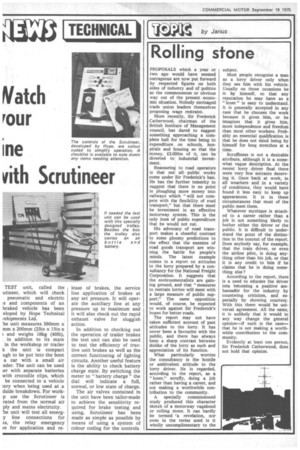Rolling stone
Page 32

If you've noticed an error in this article please click here to report it so we can fix it.
PROPOSALS which a year or two ago would have seemed outrageous are now put forward by respected figures on both sides of industry and of politics as the commonsense or obvious way out of the present economic situation. Nobody envisaged trade union leaders themselves proposing wage restraint.
More recently, Sir Frederick Catherwood, chairman of the British Institute of Management council, has dared to suggest something approaching a complete halt for the time being to expenditure on schools, hospitals and housing so that the money, 0,000m of it, can be diverted to industrial investment.
Reassuring to road operators is that not all public works come under Sir Frederick's ban. He has the further temerity to suggest that there is no point in ploughing more money into railways which "will not compete with the flexibility of road transport," but that there must be investment in an effective motorway system. This is the only item of public expenditure that he would not cut.
His advocacy of road transport makes a cheerful contrast ' to some gloomy predictions to the effect that the enemies of road goods transport are winning the battle for people's minds. The latest example comes in a report on attitudes to the lorry prepared by a consultancy for the National Freight Corporation. It suggests that the environmentalists are gaining ground, and that "measures to restrain lorries will meet with a large measure of public support." The same opposition would, of course, be expected to work against Sir Frederick's hopes for better roads.
The report may not have taken sufficient account of past attitudes to the lorry. It has never been a favourite with the public, and there has always been a sharp contrast between dislike of the lorry as such and appreciation of its function.
What particularly worries the consultancy is the hostile or ambivalent attitude to the lorry driver. He is regarded, according to the report, as a "loner," scruffy, doing a job rather than having a career, and not making a worthwhile contribution to the community.
A specially commissioned study produced this character sketch of a motorway vagabond or rolling stone. It can hardly be termed 'a revelation, nor even in the terms used is it wholly uncomplimentary to the subject.
Most people recognise a man as a lorry driver only when they see him with his vehicle.
Usually on those occasions he is by himself, so that any reputation he may have as a " loner " is easy to understand. It is generally accepted in any case that he chooses the work because it gives him, or he imagines that it gives him, more independence and freedom than most other workers. Probably an essential qualification is that he does not mind being by himself for long stretches at a time.
Scruffiness is not a desirable attribute, although it is a some what vague description. At the recent lorry driver final there were very few entrants deserv ing it. Once back at work, in all weathers and in a variety of conditions, they would have found it less easy to keep up appearances. It is in these circumstances that most of the public meet them.
Whatever mystique is attached to a career rather than a job is not something likely to bother either the driver or the public. It is difficult to under stand the point of the distinc tion in the context of the report. Does anybody say, for example, that the train driver, or even the airline pilot, is doing anything other than his job, or that it is any credit to him if he claims that he is doing something else ?
According to the report, there is a need to educate the driver inte becoming a positive am bassadtir for the industry by countering criticism, and es pecially by showing courtesy.
With this there would be universal agreement. All the same, it is unlikely that it would in any way change the general opinion—if such is the case— that he is not making a worthwhile contribution to the community.
Evidently at least one person, Sir Frederick Catherwood, does not hold that opinion.
















































































































